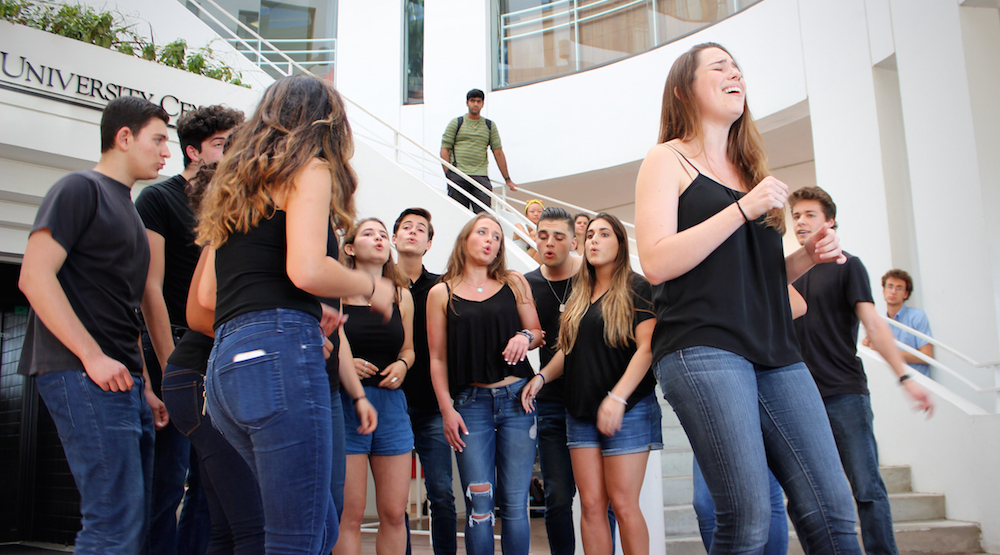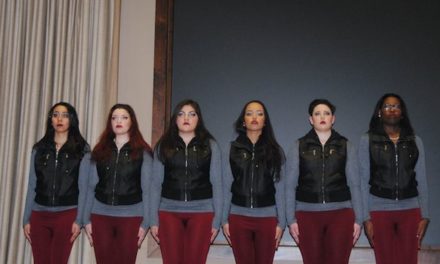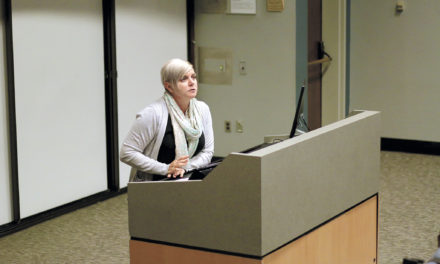You thought Ivy League acceptance rates were scary. That’s nothing in comparison to getting into one of Emory’s seven a cappella groups.
Despite the popularity of collegiate a cappella today, no one knows exactly how it came about. One of the oldest groups, the Yale Whiffenpoofs, was founded in 1909 as an off-shoot of Yale’s glee club, but the art form has grown immensely since the early 20th century and exists on campuses across the country, making it a uniquely collegiate tradition.
On Emory’s campus, chattering students begin to materialize outside of the Dobbs University Center (DUC) Terraces around five o’clock on the first Friday of each month, excitedly dragging over aluminum chairs to make up a crowded front row for the Emory a cappella tradition known as “First Friday.”
Since its beginning in 1994, First Friday has become a monthly celebration of a cappella during which each group performs two songs for a large crowd consisting of their fellow students, thus demonstrating the passion for a cappella that exists on Emory’s campus. First Friday currently features performances from six groups: AHANA, Aural Pleasure, ChaiTunes, Dooley Noted, The Gathering and No Strings Attached.
In addition to these six, Emory has a new a cappella group: Suri.
“We’ll [perform] top 40 hits on Spotify mixed with popular new movies coming out in Bollywood (Hindi cinema),” Suri member and College sophomore Tejal Pandharpurkar said. “We [have] this shared goal of sharing Indian music with Emory students.”
Suri will join in at future First Fridays.
Graphics by Olivia Shuler / Staff
“First Friday was founded over a decade ago by the president, at that time, of No Strings Attached,” President of No Strings Attached and College junior Brian Steinberg said. “It [is] a platform for all of the a cappella groups to meet and perform for the a cappella community and all of the fans, showcase new songs and celebrate that culture that we have here.”
The members of Emory’s groups fervently believe that, here, the attitudes and culture surrounding the art form are entirely unique from other colleges.
“I feel like there’s a pretty distinct divide [at other colleges] between the groups that are really serious and the groups that are doing [a cappella] more for fun,” Music Director of The Gathering and College senior Andrea Molino said. “At Emory, people take it seriously. At Emory, everyone’s very committed to it.”
For Emory’s singers, that seriousness and level of commitment becomes apparent as soon as the audition process begins.
“In the first section of every audition process, the first step is seeing what basic musical skills a person has. Then if you make callbacks, there’s a second step: how well do I fit into the group, and are my musical skills up to the test of learning the piece quickly enough.” Music Director of Dooley Noted and College sophomore Eric Newell said. “It’s pretty competitive; around five out of 100 got in [last year], and six out of 100 this year.”

Graphics by Olivia Shuler / Staff
But that seriousness, which would lead one to imagine that being in an a cappella group means a lot of grueling practice sessions and stuffy performances in tuxedos, instead speaks to the love that these musicians have for their art and for creating performances that cause their fellow Emory students to share their love of a cappella.
“We’re all really good friends,” Newell said. “We like to have mixers between the groups, and we all hang out together. A lot of good friendships are formed, not only within our own groups, but between them, because we all have this common element of singing together.”
As with any group that combines social relationships and high-pressure projects, such as learning new songs quickly, interpersonal and political issues come up. More recently, however, Emory’s groups have begun to come together politically, according to Steinberg, in order to respond to a new challenge facing the a cappella community: practice spaces. This year, in an administrative change, the a cappella groups were told that they could no longer rehearse at the Schwartz Center.
“What we were told is that the Schwartz Center was built to house arts majors, dance majors [and the like], and [therefore] extra-curricular groups aren’t what the core essence of the Schwartz Center is designed for,” Steinberg said. “We’re starting to develop a group, the Student Non-Curricular Arts Community. [This] is the first time when all of the presidents have acted together and got our community as a whole together. This is the first time we’ve realized that we have to unite and show what matters to us, and make sure we have a place to perform and rehearse.”
Referencing such social and political scenes in Emory’s a cappella, Steinberg added, with a smile, “It’s very much like Pitch Perfect, but subtract out a lot of the drama and glamor.”
Pitch Perfect (2012) and Pitch Perfect 2 (2015), which follow the story of an all-female, collegiate a cappella group, have brought this musical style into the pop-culture limelight. The two films feature flashy performances with perfectly choreographed dances and glitzy solos, and, as one would expect from Hollywood blockbusters, emphasize the intense drama that goes on behind the scenes.
“Now that the audience has seen Pitch Perfect, they expect [our performances] to be theatrical, and they expect Fat Amy to get out there with flames in the background,” President of Dooley Noted and College junior Henry Hays said.
While many of the leaders of Emory’s a cappella groups agreed that the theatrical performances portrayed in Pitch Perfect place unrealistic expectations on collegiate a cappella groups, members of The Gathering, Emory’s only all-female a cappella group, see the movie in a more positive light.
“I think all-girls groups can have a stigma of being super high because you don’t have the low sound,” College senior and President of The Gathering Ashley Marquardt said. “Pitch Perfect definitely helped [reduce] that slight preference for co-ed groups.”
Not only was a cappella recently thrust into the pop culture spotlight via Pitch Perfect, but groups such as the Grammy award-winning quintet Pentatonix are beginning to make a name for themselves in the mainstream music scene — their album That’s Christmas to Me (2014) went platinum, selling over one million copies.
The a cappella style allows groups to bring musical elements from a variety of genres, giving beloved songs an innovative and exciting twist.
“We’re containing everything that pop music is for the entertainment world and everything that makes songs sound so good in choral music,” Newell said.
The groups’ Music Directors have the task of arranging songs, deciding how different instrument sounds will be translated into vocal sounds and making the piece sound great from a technical standpoint.
“A choir can sing in an ‘a cappella’ sense, but a lot of times they’re all singing the same words,” Molino said. “With a cappella, it’s very specifically that you’re emulating the sound of a song and the sound of instruments.”
Despite the long hours of practice that a cappella groups put in each week, smiles quickly form on each of the faces of the group members when they talk about why they love this art form so much.
“Well, we love singing,” Treasurer of Dooley Noted and College sophomore Eve Gleeson said. “It’s cool to have different parts — when you sing [your part] by yourself, it doesn’t sound like really anything, but it’s cool to have everyone come together and actually sound like a song.”
With the same fervor, Molino said: “There’s just something so emotional and meaningful when, all of [a] sudden, the group of girls just sounds so in sync together, but you’re still able to hear everyone’s voice.”
It seems that this is the spirit of a cappella at Emory — that everyone can put their talents together to create something beautiful in a cohesive group that still lets every member shine. Perhaps this is what draws hundreds of excited students, regardless of musical knowledge or background, to First Friday. Perhaps the reason we can all appreciate a capella is that, in essence, its spirit isn’t all that different from the spirit of college itself.
Arts & Entertainment Editor Julia Munslow contributed reporting.
The Emory Wheel was founded in 1919 and is currently the only independent, student-run newspaper of Emory University. The Wheel publishes weekly on Wednesdays during the academic year, except during University holidays and scheduled publication intermissions.
The Wheel is financially and editorially independent from the University. All of its content is generated by the Wheel’s more than 100 student staff members and contributing writers, and its printing costs are covered by profits from self-generated advertising sales.






